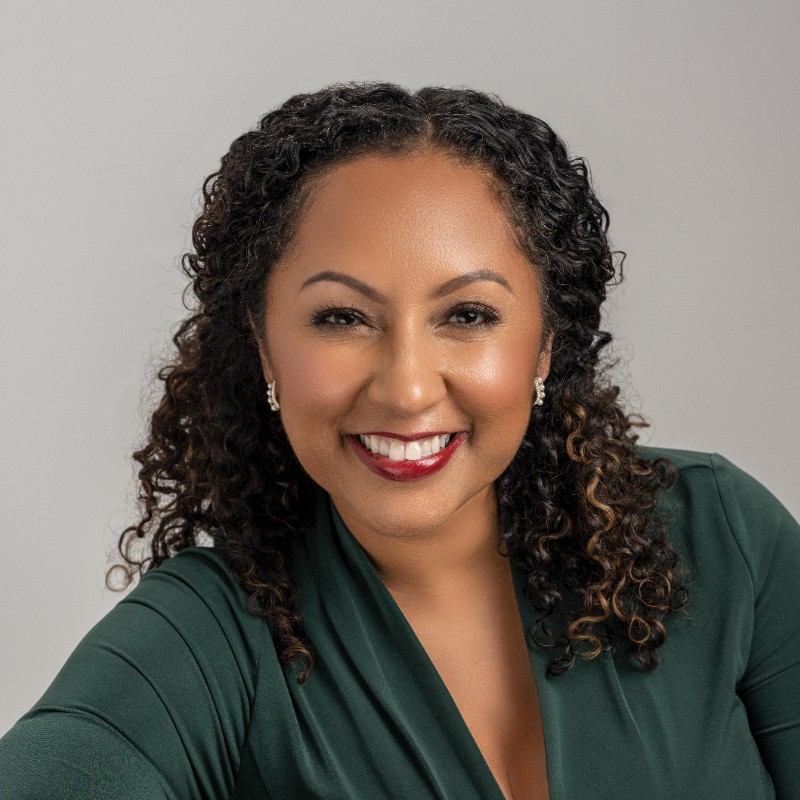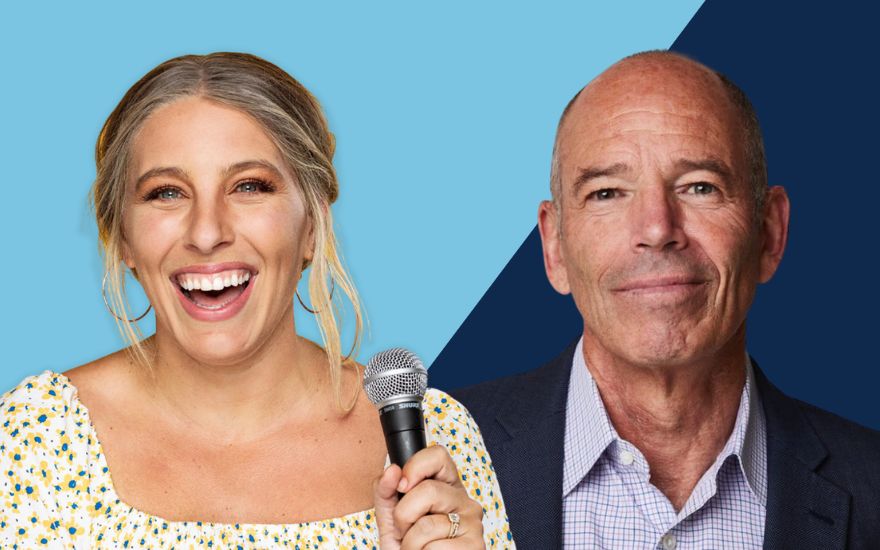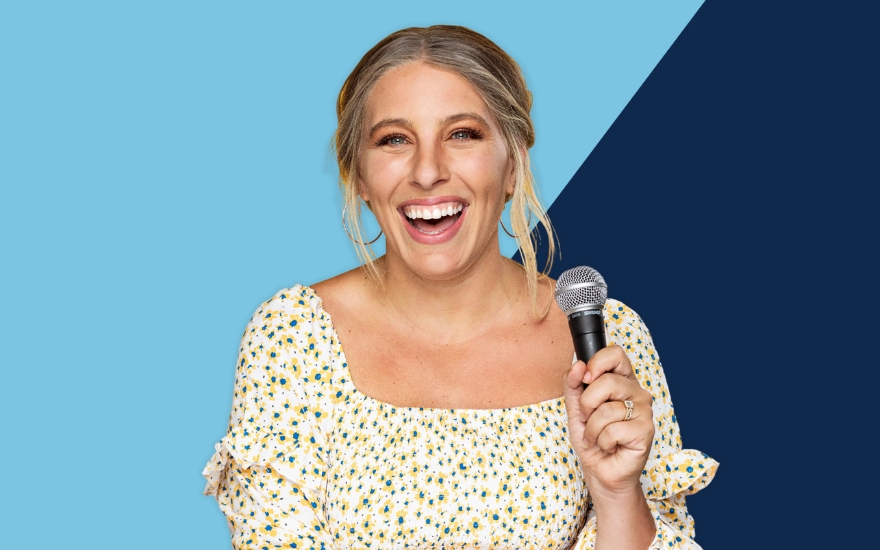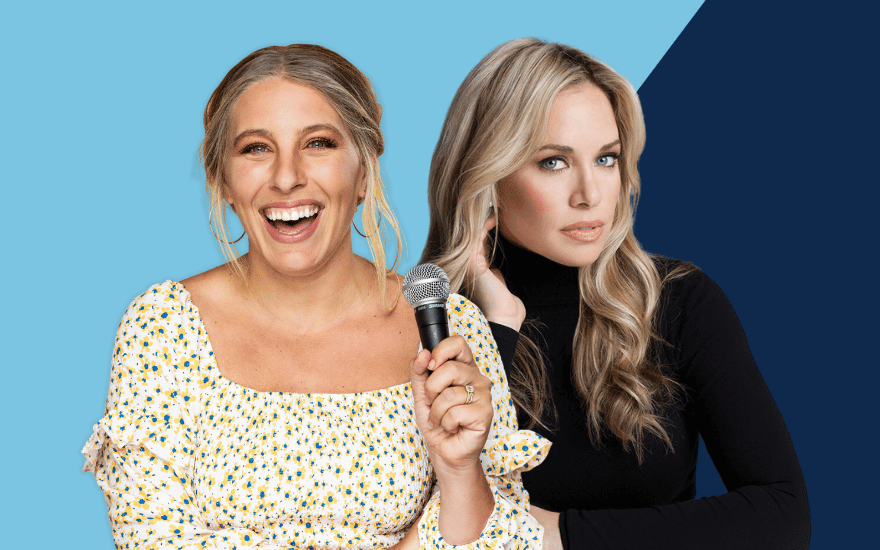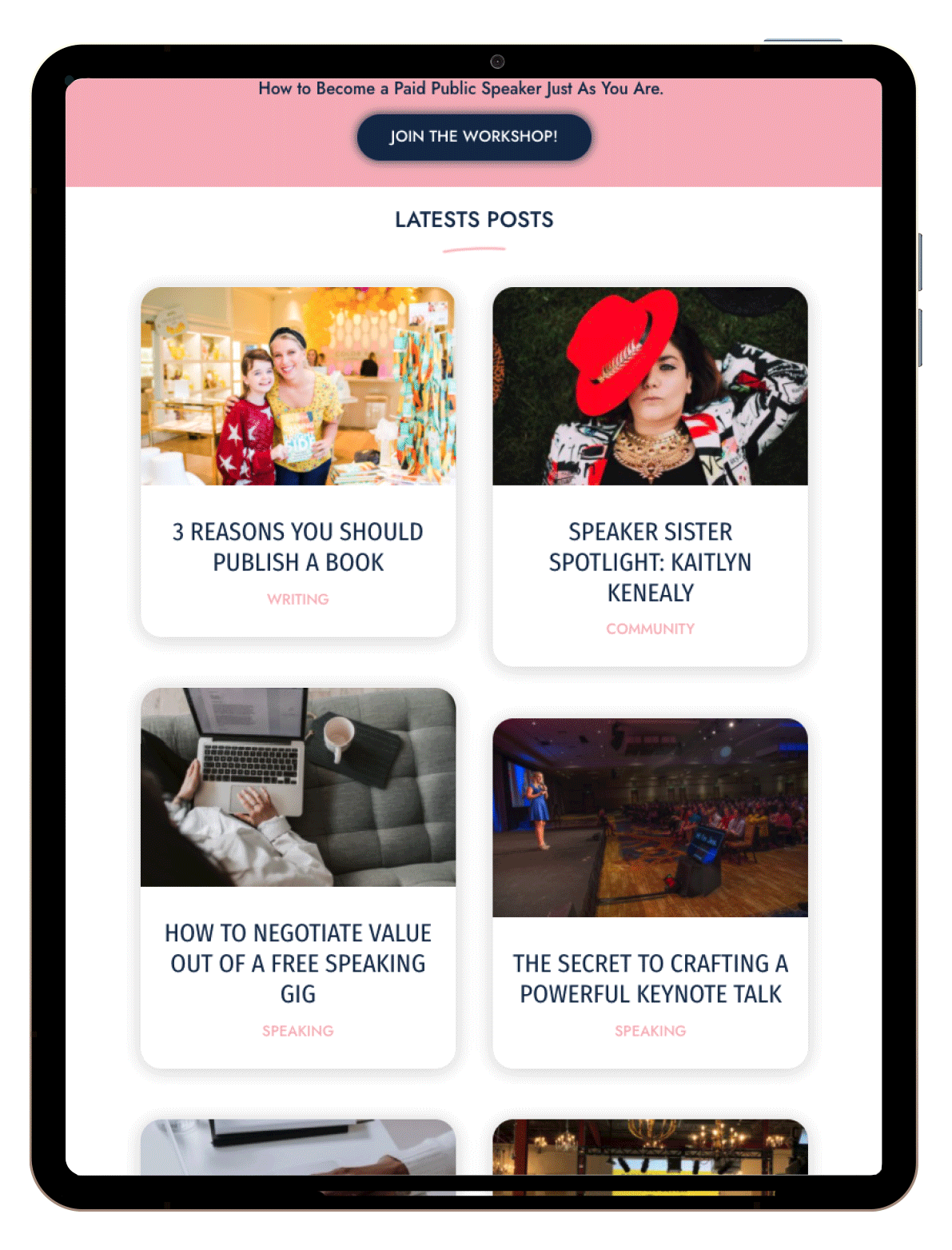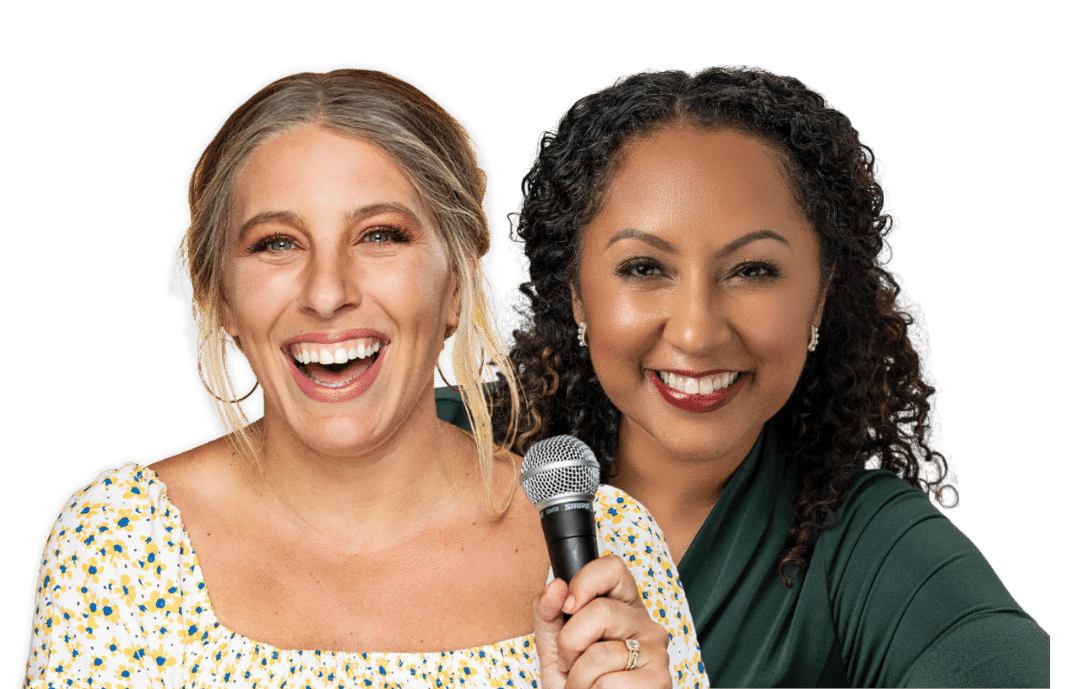


Diversity in the Speaking World: The Uplifting Impact of Deanna Singh



JUMP TO
PODCAST HOME
LISTEN TO THE EPISODE
ON THIS EPISODE OF AMPLIFY
Jess and guest Deanna Singh discuss the significance of diverse perspectives in conferences and events, highlighting the value they bring to the audience.
FOLLOW DEANNA
ABOUT OUR GUEST – DEANNA SINGH
Deanna, Founder and Chief Change Agent of Flying Elephant, leads multiple social ventures aiming for equity. She’s an author and holds degrees from Fordham, Georgetown, and the University of Wisconsin. Recognized by Milwaukee Business Journal and Forbes.
SHOW NOTES
Growing up in a household of 30+ people, with an African American mom and a Sikh American dad, the importance of diversity was ingrained in Deanna Singh from the moment she was born.
As a speaker, however, she noticed that diversity was clearly not a value of every event organizer.
Today, Jess and guest Deanna Singh emphasize the need for diverse perspectives in conferences and events to provide unique and valuable content to the audience.
Deanna Singh is the managing partner of Uplifting Impact, and the author of Actions Speak Louder.
[03:34] Public speaking is a skill, not a gift.
[05:38] Overcoming fear and embracing imperfections in public speaking.
[09:40] Diversity (or lack of diversity) in the speaking industry.
[12:23] Creating equity and inclusion helps meet everyone’s goals.
[14:32] Increasing diversity by changing recruitment practices.
[19:56] Inviting diverse speakers only for diversity topics.
[21:50] Advocating for others and sharing opportunities.
Amplify with Jess is produced by Earfluence, and brought to you by Mic Drop Workshop.
TRANSCRIPT
Deanna Singh – 00:00:01:
When you bring in somebody who comes in with a diverse perspective, what you’re doing is you’re giving your audience oftentimes something that they can’t get anywhere else, right? And isn’t that kind of what you want to do as a conference planner? You want to give people an opportunity to see something that they’re not seeing in other places, getting perspective that they can’t see. And so I think it’s about thinking about what are you trying to achieve and how does making sure that you’re diversifying and that you’re creating this equity and that you’re creating more inclusion, how does it actually help you meet those goals?
Jess Ekstrom – 00:00:33:
Welcome to Amplify with Jess Ekstrom, a show designed to help women get out of their head and into their zone of influence. One of the reasons I started Mic Drop Workshop was because of the lack of representation in the speaking industry and just thought leadership in general. One time I remember going into Barnes & Noble and going to the business section. In every forward-facing book on the shelf, was authored by a white male. And 30%, only 30% of speakers are women. And the numbers around speakers who are non-white are staggering. Our guest today will tell us that everywhere in the workplace, from nonprofits to Fortune 500 companies, diversity, equity, and inclusion has been a struggle. But we are making progress, and one of the reasons for that progress is our guest today, Deanna Singh. Deanna is the managing partner of Uplifting Impact, author of Actions Speak Louder, and phenomenal speaker. And her DEI journey began back as far as she can remember.
Deanna Singh – 00:01:38:
I lived in a home where we had a lot, a lot of people. And the reason why we had a lot of people, and I’m saying like three bedroom house, never less than 30 people living here. The reason why we had so many people is because my parents decided to open up our home to anybody who needed a place to stay. And my mom is African-American. And my dad is a Sikh American. And so, he’s from Punjab, India, and my mom is from Magee, Mississippi . And so you could just imagine, right, like the different kinds of people that we had who stayed in our home. And many of them were actually not English speakers. Now, I had the great fortune. This is a long story. I’m trying to make it short, Jess. But I had the great fortune of being able to go to India by myself when I was three and a half years old. So I was just learning English, went to India by myself, like without my parents or anybody who’s the first person in the village, American in the village. So nobody there spoke English. So completely forgot how to speak English, came back to America. And had to relearn how to speak English, but learned how to speak Punjabi there. So we had a lot of people in our home who were speaking different languages. And I was the only person who was actually, even my parents, my mom and dad, my mom doesn’t speak, you know, fluently in Punjabi or understand or anything like that. And my dad, you know, was still learning English. And so I was the only person in my family who actually had the ability to speak both of those languages. And what that did was it elevated me pretty quickly, right? And so I ended up being the person who had to answer all the phones, right? Because people were nervous. Like, what if I don’t understand what the person on the line is saying? Or I became the one who made all the doctor’s appointments. And I was the one who talked to the school and I was the one who booked, you know, anything that we had to do as a family. And so I think pretty early on, I just had a very strong understanding of what my voice could do and how I could be a voice for maybe other people who didn’t have that kind of inclination. And so, yeah, I think, you know, it didn’t occur to me until my 30s that I realized like people are really nervous about talking in front of people. I mean, in front of like, a thousand people, 10,000 people, 15,000. I actually, like, it doesn’t change.
Jess Ekstrom – 00:03:36:
It doesn’t matter.
Deanna Singh – 00:03:36:
No, not at all.
Jess Ekstrom – 00:03:38:
And do you think it’s because you were just like constantly flexing that muscle growing up?
Deanna Singh – 00:03:42:
Yeah. I do think that it is a learned skill. You know, it’s not something that I realized as I was doing it, but looking back on it and then coaching people too, I can see that it’s just like any other skill, right? You’re not going to get good at something until you do it again and again and again and again.
Jess Ekstrom – 00:03:58:
Yeah.
Deanna Singh – 00:04:00:
Yeah.
Jess Ekstrom – 00:04:00:
You, so is there ever a time that you get nervous?
Deanna Singh – 00:04:04:
The only thing I get really like anxious about is I always want to be respectful of people’s time, right? So like, if somebody is like Deanna, you have 15 minutes, I want to be like, 15 minutes or 14 minutes and 15, you know, so like that gets me anxious. And then I always just want to make sure that. What a gift, right? If somebody is listening to you and they’ve like invested the time or the energy, like what a gift. And I never, ever, ever want somebody to walk away like, that was a waste of time. Or she wasn’t, you know, whatever. And so I just feel like it’s such a gift. And so that’s the other thing is I’m always like, I want to leave it all on the stage. Like, leave everything in the microphone. You know, so I think that’s, those are the two things that like, whenever I feel anything, but it’s never like how big the audience is or nothing like that. It’s always just time. Oh my gosh. Because I have no internal clock. And did I leave it all on the stage?
Jess Ekstrom – 00:04:58:
Yes. Yeah, I always say the pressure is a privilege. I’m like, what a gift it is to have a microphone in your hands. And the timing part, I remember like, it’s, you know, made me think of when I was doing a TEDx talk and it’s like, they are so, you know, punctual. And I’m like, so what is the timing? They were like 12 minutes. And I was like, okay, so like land like 10 to 15. And they were like, no, you land at 12. I was like, what? This is crazy. So yeah, no, I totally get it. But yeah, I think you’re right. Even for people who haven’t flexed that muscle ever since you were a kid, it’s never too late. I mean, for me, flexing that muscle was like teaching fitness classes in college and giving tours to prospective students. And it was like, even though I wasn’t talking about like, you have potential and you can do it. But it was just the idea of I can get up and I can present something and I can also mess up.
Deanna Singh – 00:06:01:
Oh, yeah.
Jess Ekstrom -00:06:02:
Life goes on. And so I think once you realize that speakers and being in that position, isn’t like the, you don’t have to be this robotic, perfect person. It’s actually better if you’re not. I mean, would you agree?
Deanna Singh – 00:06:15:
I have to tell you something so funny. I didn’t realize that I was doing this really until probably like a couple of weeks ago. And I told my kids, I was like, this is so funny. One of the things that I do is I actually imagine myself falling off the stage every day, but I don’t do it. Like when I’m like, now it’s time to imagine myself falling off the stage. But whenever I go and I see a space, one of my first thoughts is, wow, how can I fall off that stage? And I think it’s so funny. The one that I didn’t realize I was doing it, but to like, now that I know that I do it, how funny is that? Because I think it, you know, when you kind of like pull it, pull it back and you’re like, well, why are you doing that? Do you think, I think part of it is like, well, that’s probably one of the worst things that could happen. And so if I could just go ahead and get that, like, you know, visual on my head.
Jess Ekstrom – 00:06:59:
Yeah, with what I do. Yeah.
Deanna Singh – 00:07:01:
Yeah. Just like, it’s just like, oh, that’s, I could probably fall off on that side. Good to know, right? And then I could just keep it going. So it’s funny to kind of just think about and reflect on, right? What are the things that, and I, I teach this in the other book that I wrote, Purposeful Hustle, like thinking about like, what’s the, really the worst case scenario, what’s the probability of that happening? And then what could you do to mitigate it? Okay. Well, the worst case scenario falling off the stage, to mitigate it, I probably don’t want to stand real close over there. And right, like, what’s the probability that’s going to happen? It depends on my heel size and how tired I am, but probably pretty low, right? So, that’s good.
Jess Ekstrom – 00:07:38:
Absolutely. I’ve actually just been learning this recently. I’ve been, anyone who’s been listening for a bit, I’ve been taking like standup comedy classes just to try to challenge my speaking, but it’s also been really fun. And they said like, you know, on the first day of class, write down the thing that you’re afraid of. Like what, what made you almost not come to this class? And we had to read them and people were like, I’m afraid of being heckled. Like what if no one laughs at my joke? And then it’s like, okay, well, what if those things happened? What would you do about it? And so I would almost, you know, challenge anyone who’s listening, who has a presentation or something that they’re doing that they might feel a certain way. It’s like, what are the worst things that could happen? And these are coming from probably two very optimistic people. And what would you do about it? Because you realize you are so adaptable and like, these aren’t as big of a deal as they might be when you just have the what ifs ruminating in your head, like falling off a stage.
Deanna Singh – 00:08:34:
Exactly. You know, and it’s just so, it’s so funny because we, if we don’t give voice to it, it’s not like it goes away. It’s still there. It’s still processing in our brain and going over and over and again. But the minute that you just say like, ah, that’s what it is, kind of acknowledge it. You know, you like make it go from being this really loud thing to something that can be really, really small and tiny.
Jess Ekstrom – 00:08:55:
And I’m sure that, and we have someone’s first virtuals coming up. I honestly, I don’t know how you feel about this, Deanna. Virtuals sometimes scares me more than a room full of 1500 people because I feed off of the energy of the people in the room. And so I really have to look into that green dot and just imagine I’m getting the laughs and the applause just like I would on stage, but it’s, it’s challenged me for sure.
Deanna Singh – 00:09:27:
Absolutely. I have a friend who actually said that they put like a smiley face on their camera, like on the side. So, they have like, a make-believe audience, you know, there that they’re talking to. I’m like, that’s really smart.
Jess Ekstrom – 00:09:36:
Okay, that’s a good idea. Well, I want to dive into diversity in the speaking industry because no better person to talk to than someone who has written multiple books, has a consulting agency uplifting impact around this. I shared this in the beginning that 69% of speakers are male, 73% of speakers are white. I know that even just as a white woman, the tokenism that I’ve experienced as a woman in the speaking industry, and even been told that before of like, why, why’d you bring me to speak? Oh, we needed a woman. I’m like, is this 1955? And so as a woman of color and someone who is helping people, you know, disrupt and challenge diversity and leadership, not just in speaking. One of the things that I really liked about what you said is like, this isn’t, you know, this like feel goodery, like, you know, let’s all come together and sing Kumbaya. This is actually necessary. Diversity is necessary for productivity, innovation, growth. Let’s start there. Can you talk to us a little bit about that?
Deanna Singh – 00:10:44:
Absolutely. So I do think it’s really important that people understand that you don’t have to do this because you’re like, Ooh, you know, it’s just like the cool thing to do now or the whatever. I think it’s important to understand that it is a cool thing to do. It is like morally right. It is awesome, right? It is, it is all those things, but it is also that doesn’t negate the fact that it’s also really good for business. And there’s so many different ways I could explain to you so many anecdotal things that I could share with you. But at the end of the day, like, think about it. When you are a person who is trying to bring together people who are coming from all different backgrounds, one of the best things that you can do is give them the opportunity to see themselves reflected, right? So one of the things that I try to tell people, and I get a chance, I have such lovely relationships with meeting planners and event planners and conference planners kind of all over the world. And one of the things I always share with them is that when you bring in somebody who comes in with a diverse perspective, what you’re doing is you’re giving your audience oftentimes something that they can’t get anywhere else, right? And isn’t that kind of what you want to do as a conference planner? You want to give people an opportunity to see something that they’re not seeing in other places, getting perspective that they can’t see. And so one of the number one reasons why you want to bring in a diverse group is not, again, just this feel goodery. It’s like, no, if we’re in an industry where there aren’t a lot of women represented and- there’s, you know, 50% of my group doesn’t ever get a chance to see a woman who’s an expert in this field actually talk about it. I’m giving them the opportunity to see a perspective that they don’t otherwise get, right? Like, and so I think it’s about thinking about what are you trying to achieve and how does making sure that you’re diversifying and that you’re creating this equity and that you’re creating more inclusion, how does it actually help you meet those goals? And for conference planners to me, that’s like one of the simplest ones, right? I want diverse perspectives. I want people to be reflected on that stage that look like the people in my audience. I want to make sure that everybody feels welcome. I cannot tell, and again, I have so many like anecdotal stories, but one of the things that happens almost, I would say 97.5%, I can’t verify that number, but I can say like, 97.5% of the time I feel like after I speak people who are women of color, right? Just people of color, you know, people who are women or young in their industry or just the different identities that I represent. So lots of people will come, they’ll skip book sign, they’ll do whatever, but there’s almost always, so 97% of the time, a crowd of people that sits, that’s representing those different identities. And the main thing that they want to tell me is like, thank you. And like, this is what I learned. And here’s my key takeaway. But one of the main things is. It was so nice to see you on that stage.
Jess Ekstrom – 00:13:27:
Hmm.
Deanna Singh – 00:13:28:
I mean, I had one man stand next to me and he’s like, I don’t want to be weird, but I just was wondering, can I just stand next to you? This is an executive in a very big industry. And he’s like, I have been coming to this conference for 30 years and I have never, ever seen a woman of color or a person of color as our featured keynote. I’ve been coming here for 30 years. This is a Hispanic man. And he’s like, so I’m not trying to be weird or anything. I don’t even have any questions for you. I just feel like I’m experiencing a moment that I never thought that I would see. And he’s the COO of this big company. He’s like, I just never thought that I would see this. And I know this is history. And I just wanted to, because I want to be able to go home and tell my wife and my kids that this happened and I stood next to you. I was like, yeah, that’s awesome. Let’s do this.
Jess Ekstrom – 00:14:16:
That gave me goosebumps. That is so powerful. And I think as it goes to the meeting planners or events, sometimes the conversation is like, oh, well, we just don’t get a lot of applications from women or people of color. So what are we supposed to do about that? And you have an interesting perspective on this as well, not just in speaking, but also in companies and in leadership. Well, they’re not applying for the executive roles. What would you say to that?
Deanna Singh – 00:14:48:
Yeah. So I love this, like, if we build it, they will come, right? And I always giggle because I’m like, actually, that doesn’t happen with any group. When you think about how you are going about your business of trying to find different people to speak or vendors that you want to work with or people that you want to bring in onto your team, there is always some action that is involved. And oftentimes, the reason why we’re not seeing a difference in who’s applying or who’s coming through is because we haven’t actually changed anything in our output, right? So we’re still going to the same places, talking to the same people, posting in the same places, using the same mechanisms. And so we can’t expect to see something different if we’re not changing any of the behavior that we have. So I think that’s one thing to just keep in mind is you can’t expect something different if you’re not doing something different. That’s not how the world works. So that’s one thing. I often tell people, so I think this works on both sides, right? So if you are a speaker and you are representing one of these different identity groups, or even if you’re not, right? If you’re part of the majority that we just saw flash across the screen, Jess. One of the things that you can do that is a very simple thing to do is to say, hey, I’m just wondering, who else is going to be on the stage? Who else are you considering? And how diverse is the candidate pool? Very simple question, costs you nothing, and is a way for you to elevate the conversation if you are one of the people who’s being considered, right? So I love to say that. Could you tell me, like, who are the other women that you’ve invited? Who are the other keynotes? How many people of color are going to be represented this year on the panel? I was looking at last year’s list and I realized you actually had no other women of color. You had no other people of color. You had no other women. You had no other people from, you know, different places in the world. What are you doing differently this year? It’s excited to hear, right? And what all it does is start a conversation. Again, cost me nothing doesn’t do. If you’re on the planning side or you’re the one who’s actually trying to do the recruitment, I would say take a look at all of your procedures and just think about like literally at each of the steps. Okay, we’re going to put out this, you know, an announcement. Where are you posting it? Are you actually posting it in places where you know diverse speakers are going to go? And if not, why aren’t you? What would be the easiest lift for you to be able to post it in someplace different? Oh, you’re going to speakers agencies or speakers bureaus? Well, have you focused on ones that actually have a cadre of women or people of color that are listed? Because there’s actually entire speaker bureaus that are focused on those demographics. Okay, oh, you are thinking about doing it based off of who your membership pool is? Well, great. Could you put a line in that says, we would really like to have a more diverse representation. So make sure that you’re, as you’re thinking about this, that you’re also considering who represents the diversity in our community as you’re making recommendations.
Jess Ekstrom – 00:17:42:
I mean, Jasmine’s comment says it all too. When I’m searching for conventions and public events, if I don’t see a person of color, I immediately move on to find another event that does. I mean, like you were saying, yes, this is cool and this is fun. It’s also a. Better business strategy. Like, and that is point blank, end of story, to have multiple types of people represented at your events. So people like you, the man who wanted to stand beside you can say, it was so cool to see someone like me. I mean, I say this probably a lot on here, but it’s like when you’re a little girl and you learn about the presidents, it’s like all of a sudden this ingrained belief of what you look like and what is possible for you starts to form a connection. And that doesn’t stop into adulthood or ever.
Deanna Singh – 00:18:38:
No, absolutely not. And I mean, Jess, like when you think about like, what’s the coolest thing that we get to do? I mean, yes, we get to go on the stages and it’s lights and all these things and everything. But one of the coolest things about being a speaker is that I know what it feels like to be in an audience. I know what it feels like to hear somebody say something that 25, 35, 40 years later, you are still holding on to. Yeah. I mean, not too long ago, this woman walked up to me and she’s like, hi, Deanna. I was just wondering if I could chat with you. I’m like, yeah. Hey, how you doing? She’s like, you won’t remember me because I was in the audience, but it was like seven years ago. And I just wanted to show you something. She opens her wallet and she pulls out a little piece of paper. And she’s like, I cut this out of my notes from a keynote that I heard you do like seven, eight years ago. And she’s like, and I keep it in my wallet. And it’s something that I go to. Like it’s, it’s something that I go to when I’m feeling like, you know, I need to remember like why I’m here and what I’m doing. Wait, what? You know what I’m saying? So that’s what I’m saying. And again, I could give you a million of those kinds of stories. So if that’s the privilege that we’re getting and that’s the ability that we’re getting, it’s important to remember that there are people out there who need those messages. And all the people don’t look the same. So all your speakers shouldn’t look the same either.
Jess Ekstrom – 00:19:50:
Exactly. And another thing that I think about too is I get a little frustrated when events are inviting a woman or a person of color to speak, but they’re only inviting them to speak about diversity. And if that is the thing that you do, like you do so well, great. But just because that they are a woman or a person of color doesn’t mean that that is the only topic that they can come and be an expert on. Do you see that as well?
Deanna Singh – 00:20:21:
Absolutely. And I, you know, the thing that happens to me often or that I get often is somebody will say, and this happens a lot within companies, less of like some of the major stages that we’re on, but within the companies where people say like, I just got asked to present on African-American history. I am an accountant. And I, you know, feel really proud of my ancestry. I don’t really know, Deanna, if I’m the right person, but I feel this pressure that I can’t say no at the same time. But at the same time, I’m like, this is not my area of expertise. And so I end up getting it a lot on the side of like,.could you help me? Right? Like, can you, cause I don’t feel prepared for this. And so I feel like I’m not going to be successful, but I also feel this incredible responsibility because this is the first time it’s often, this is the first time we’re having this kind of conversation, or I’m such an advocate for us to do this. But, I just don’t know that I’m the right person. Um, yeah.
Jess Ekstrom – 00:21:21:
And that’s a big moment as a speaker is to be able to say the thing that you’re looking for isn’t what I do. Let me find someone who does. Because in the beginning of your career, like it’s like, of course I will speak about cryptocurrency. It’s funny. I think my uncle has Bitcoin. You’re just like, for sure. And then when you get to a point where you’re like, you know what, this is what I do and this is what I do. Well, let me find someone else who does. Speaking of that, I would love to close with advice that you have to like, how do we keep the good going? Like you said, it’s a gift when you’re given the mic. I think that that gift can continue to give after you’re done with the mic. And how do we keep stages diverse when we’re in this, this industry?
Deanna Singh – 00:22:11:
So one of the things to your point earlier, like I actually have a list of other speakers. One of the things that I’ll get a lot of requests for is like, could you speak on this topic? And I’m like, yeah, I could, but I actually am not from that identity group. Or I don’t think that I’m the right person to get that message across. And so I have a list of people that I know, that I trust, that I know are really great. Some have been in the industry for some time. Some are new, right? And I keep that list. And so it’s very common for me to be like, I’m not your person, but I know who is, right? And so I think part of it is like, we have to be advocates for one another. And that is a really beautiful thing. I feel like you can’t over give, like that always gets that reservoir always gets filled back up again. And so I think that’s one thing. That’s one way you can do it is just like asking, like saying, hey, I’m not the person, but here’s my list and starting to build your list and share your list as appropriate. I think another thing is asking those questions, you know? So, hey, is it okay for, you know, it looks like, thank you so much. I’m so glad to be your keynote speaker. For your panel, have you thought about, you know, who else you might want to bring? Cause I have some recommendations, right? So like, it’s also not just waiting for people to come, but also saying like, hey, could I maybe put you in touch with this person or bring you into this person? Another thing that I really, really love to do is I like to say, especially with organizations where I know they’re going to want something that maybe I can’t do or whatever the next level is going to be, is I say, hey, can I bring somebody with me? I’m going to do your keynote. I’m going to do, but can I bring somebody with me? Because I really think this would be a great way for them to get to know your organization. I think as you’re thinking about your next steps, they would be a good person and a good fit. So there’s all these cute little ways, right? And the other thing that I will just tell you is that I really love to extend an invitation to somebody who might be thinking that this is something they want to do. So I’ll say, hey, can I bring a guest? And I’ve had people who will come and like, I’ll be like, oh, you know, they’re actually just on my team and they’re helping set up the book table or they’re helping do something that I don’t, maybe I don’t even need the help for. But just like, because I want to make sure that other people get an opportunity to just see what this feels like, right? See what it looks like. And actually be in it with me. And so I’ve had a lot of people over the years who like just come to get an understanding of like, this is what really goes into it. This is what the background looks like. Because that’s an easy thing. It’s an easy lift for me to just be like, hey, you want a shadow? Come on, let’s go.
Jess Ekstrom – 00:24:39:
Oh, I love that. I’m definitely going to be stealing that. I think, you know, having some speakers on lock of like, even in a PDF format or something that you’re just like, this isn’t for me, but here are five other speakers that I recommend is great. One of my favorite things to come out of one of our programs called Mic Drop Academy is after they complete it, they get certified on our roster. And so we have this amazing roster of women speakers that if an event comes to me or they’re coming to us for, we need this and this and this, it’s like, here you go. And it’s the most incredible thing when you can have, say with confidence, like, here are some amazing speakers that you should bring and also be able to, like you were saying, call up, you know, events that maybe their panels are, you know, all white, all men, you’re looking at the lineup. That happened to me the other day with a bureau that reached out to me and it’s like, all of their featured speakers were men. And I’m like, I’d love to be on your bureau, but this needs to change first. And I’m happy to help facilitate some of these introductions. We have someone who wants to shadow you. Elise is a great student in Mic Drop right now, but thank you so much for being here. Everyone definitely go by Actions Speak Louder. If you are here, on behalf of the company also check out Uplifting Impact. They do some amazing consulting services. You also have a really great ebook on there that I would definitely recommend. So go and check them out, but thank you so much. Anywhere else that we can find you besides here on LinkedIn.
Deanna Singh – 00:26:21:
I think LinkedIn is really the best place. You know, the website is Uplifting Impact. So if there is something that you’re looking for, we do consulting and we do a lot of learning and development and obviously a ton of keynote speaking. So, if there’s anything that we can do to support anybody here, but I just like to stay in touch. So keep me posted. Know I’m rooting for you. There’s so much good work that needs to be done in the world and we need a lot of amazing people to do it.
Jess Ekstrom – 00:26:45:
Yes, absolutely. Awesome. Thanks, Deanna. Thanks everyone for tuning in. Bye everyone.
Deanna Singh – 00:26:50:
Bye.
Jess Ekstrom -00:26:55:
Thanks for listening to Amplify. If you are a fan of the show, show us some podcast love by giving us a rating and review. And give us a follow @MicDropWorkshop and @JessEkstrom. This episode was edited and produced by Earfluence and I’m Jess Ekstrom, your host. Remember that you deserve the biggest stage. So let’s find out how to get you there. I’ll see you again soon.
MORE FROM THE AMPLIFY PODCAST
Netflix Co-founder Marc Randolph on Testing New Material On Stage
JUMP TOPODCAST HOMELISTEN TO THE EPISODEON THIS EPISODE OF AMPLIFYAs co-founder and first CEO of Netflix, Marc Randolph led the company from its inception in 1998 through its IPO in 2002. He left the company a year later to pursue other passions, which includes public...
More Doors Open When You Take the Opportunity
JUMP TOPODCAST HOMELISTEN TO THE EPISODEON THIS EPISODE OF AMPLIFYWhen Jess was in college, she applied for an internship with NBC’s Today Show…and got it. In the back of her mind though, she was pretty sure she only got the job for a nefarious reason. But did that...
Creating Confidence On Stage, with Heather Monahan
JUMP TOPODCAST HOMELISTEN TO THE EPISODEON THIS EPISODE OF AMPLIFYToday we explore what many of us struggle with - the power of confidence and self-belief. The trick is that confidence is a muscle we can work on every day, and we can create a strong foundation from...

Mic Drop Workshop® helps women tell and sell their story as paid public speakers
Subscribe to our weekly newsletter!
Receive direct access to upcoming events and event planners who are looking for public speakers, keynote speakers, motivational speakers, event industry trends, and our favorite speaker products & services.
© Copyright 2024 Jess Ekstrom. All Rights Reserved | Terms & Conditions | Privacy Policy | FAQ | Contact
Website & Branding Design by Orange Moss Creative




